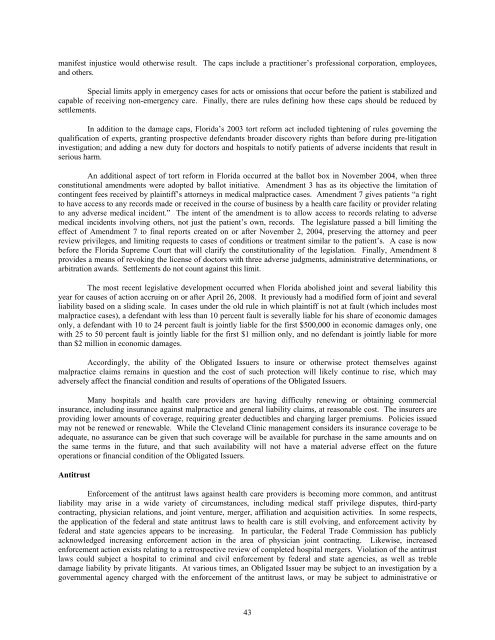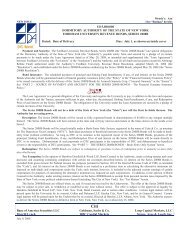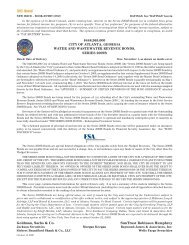Malpractice Lawsuits and Malpractice InsuranceThe ability of, and the cost to, the <strong>Obligated</strong> Issuers to insure or otherwise protect themselves againstmalpractice claims may adversely affect their future results of operations or financial condition. For furtherinformation, see “PART II. THE OBLIGATED GROUP — K. LIABILITY CONSIDERATIONS ANDLITIGATION” in APPENDIX A hereto.The ability of health care providers to obtain malpractice insurance in Ohio and Florida, like most of therest of the United States, has significantly deteriorated as rates for such insurance have increased, <strong>com</strong>mercialproviders have reduced their participation in, or withdrawn entirely from, the medical malpractice insurance realm,and PHICO, a Pennsylvania private malpractice insurer that had written such medical malpractice policiesnationally, was declared insolvent. In addition, the events of September 11, 2001 and the attendant decline infinancial markets and their impact on insurance <strong>com</strong>panies’ assets had an adverse impact on the medical malpracticeinsurance market. However, in 2003, both Ohio and Florida enacted legislation to limit amounts of money injuredpatients may recover in medical malpractice lawsuits. Although this legislation is intended to stabilize the liabilityinsurance market, this will only occur over time, if at all.In 2003, Ohio enacted legislation to limit amounts of money injured patients may recover in medicalmalpractice lawsuits. Although this legislation is intended to stabilize the liability insurance market, this effect willonly occur over time, if at all. The central benefit of the Ohio reforms is a <strong>com</strong>plex cap on non-economic damagesin medical malpractice cases. The basic cap is the larger of $250,000 or three times economic damages, subject to amaximum of $350,000 per plaintiff and a maximum of $500,000 per occurrence. These maximum amounts increaseto $500,000 per plaintiff and $1 million per occurrence if the plaintiff has suffered permanent and substantialphysical deformity, loss of use of a limb, loss of a bodily organ system, or permanent physical functional injury thatprevents him from being able to independently care for himself and perform life sustaining activities. The cap doesnot limit the non-economic damages that family members can recover in a wrongful death case, but it does limit theright of a decedent’s estate to recover for damages like conscious pain and suffering that the decedent experiencedprior to death.In addition, in 2005, Senate Bill 80 became law in Ohio. This law extended many of the 2003 Ohiomedical malpractice reforms to other areas of tort law, and, among other things, established a cap on non-economicdamages in non-catastrophic cases and imposed a cap on punitive damages.The Ohio Supreme Court recently affirmed the constitutionality of several provisions of the 2005 tortreform act in Arbino v. Johnson & Johnson. Decided on December 27, 2007, the Ohio Supreme Court upheld theconstitutionality of the caps on non-economic damages and punitive damages, and further found that neither capviolated the separation of powers or single subject rule. The Ohio Supreme Court did not rule, however, on achallenge to the collateral source provision, as the court concluded that the plaintiff did not have standing tochallenge that provision.In Florida, a <strong>com</strong>prehensive tort reform statute took effect September 15, 2003, for lawsuits filed on orafter that date. The most important provisions of the statute are those related to damage caps. All the caps are onnon-economic damages only. These are somewhat <strong>com</strong>plicated, because there are separate caps for “practitioners”(primarily doctors) and non-practitioners (primarily hospitals). In both cases, the caps depend on the seriousness ofinjury.Non-economic damages from all non-practitioners (including hospitals) are limited to $750,000 perclaimant and $1.5 million in the aggregate. The $750,000 is increased to $1.5 million in cases of death or apermanent vegetative state, and can be increased to $1.5 million for catastrophic injuries if the court makes anappropriate finding that manifest injustice would otherwise result. The caps include a hospital’s vicarious liabilityfor its employees and agents.Non-economic damages from all practitioners (including doctors) are limited to $500,000 per claimant and$1 million in the aggregate. The $500,000 is increased to $1 million in cases of death or a permanent vegetativestate, and can be increased to $1 million for catastrophic injuries if the court makes an appropriate finding that42
manifest injustice would otherwise result. The caps include a practitioner’s professional corporation, employees,and others.Special limits apply in emergency cases for acts or omissions that occur before the patient is stabilized andcapable of receiving non-emergency care. Finally, there are rules defining how these caps should be reduced bysettlements.In addition to the damage caps, Florida’s 2003 tort reform act included tightening of rules governing thequalification of experts, granting prospective defendants broader discovery rights than before during pre-litigationinvestigation; and adding a new duty for doctors and hospitals to notify patients of adverse incidents that result inserious harm.An additional aspect of tort reform in Florida occurred at the ballot box in November 2004, when threeconstitutional amendments were adopted by ballot initiative. Amendment 3 has as its objective the limitation ofcontingent fees received by plaintiff’s attorneys in medical malpractice cases. Amendment 7 gives patients “a rightto have access to any records made or received in the course of business by a health care facility or provider relatingto any adverse medical incident.” The intent of the amendment is to allow access to records relating to adversemedical incidents involving others, not just the patient’s own, records. The legislature passed a bill limiting theeffect of Amendment 7 to final reports created on or after November 2, 2004, preserving the attorney and peerreview privileges, and limiting requests to cases of conditions or treatment similar to the patient’s. A case is nowbefore the Florida Supreme Court that will clarify the constitutionality of the legislation. Finally, Amendment 8provides a means of revoking the license of doctors with three adverse judgments, administrative determinations, orarbitration awards. Settlements do not count against this limit.The most recent legislative development occurred when Florida abolished joint and several liability thisyear for causes of action accruing on or after April 26, 2008. It previously had a modified form of joint and severalliability based on a sliding scale. In cases under the old rule in which plaintiff is not at fault (which includes mostmalpractice cases), a defendant with less than 10 percent fault is severally liable for his share of economic damagesonly, a defendant with 10 to 24 percent fault is jointly liable for the first $500,000 in economic damages only, onewith 25 to 50 percent fault is jointly liable for the first $1 million only, and no defendant is jointly liable for morethan $2 million in economic damages.Accordingly, the ability of the <strong>Obligated</strong> Issuers to insure or otherwise protect themselves againstmalpractice claims remains in question and the cost of such protection will likely continue to rise, which mayadversely affect the financial condition and results of operations of the <strong>Obligated</strong> Issuers.Many hospitals and health care providers are having difficulty renewing or obtaining <strong>com</strong>mercialinsurance, including insurance against malpractice and general liability claims, at reasonable cost. The insurers areproviding lower amounts of coverage, requiring greater deductibles and charging larger premiums. Policies issuedmay not be renewed or renewable. While the <strong>Cleveland</strong> <strong>Clinic</strong> management considers its insurance coverage to beadequate, no assurance can be given that such coverage will be available for purchase in the same amounts and onthe same terms in the future, and that such availability will not have a material adverse effect on the futureoperations or financial condition of the <strong>Obligated</strong> Issuers.AntitrustEnforcement of the antitrust laws against health care providers is be<strong>com</strong>ing more <strong>com</strong>mon, and antitrustliability may arise in a wide variety of circumstances, including medical staff privilege disputes, third-partycontracting, physician relations, and joint venture, merger, affiliation and acquisition activities. In some respects,the application of the federal and state antitrust laws to health care is still evolving, and enforcement activity byfederal and state agencies appears to be increasing. In particular, the Federal Trade Commission has publiclyacknowledged increasing enforcement action in the area of physician joint contracting. Likewise, increasedenforcement action exists relating to a retrospective review of <strong>com</strong>pleted hospital mergers. Violation of the antitrustlaws could subject a hospital to criminal and civil enforcement by federal and state agencies, as well as trebledamage liability by private litigants. At various times, an <strong>Obligated</strong> Issuer may be subject to an investigation by agovernmental agency charged with the enforcement of the antitrust laws, or may be subject to administrative or43
- Page 1 and 2: NEW ISSUEBOOK ENTRY ONLYSee “RATI
- Page 3 and 4: TABLE OF CONTENTSINTRODUCTORY STATE
- Page 5 and 6: OFFERING CIRCULARRelating to$452,34
- Page 7 and 8: Security and Sources of Payment for
- Page 9 and 10: Upon issuance of the Series 2008A B
- Page 11 and 12: (ii) acquisition of magnetic resona
- Page 13 and 14: $147,200,000 Term Bonds Due January
- Page 15 and 16: that the redemption is conditional
- Page 17 and 18: Use of Certain Terms in Other Secti
- Page 19 and 20: County BondsThe Cleveland Clinic an
- Page 21 and 22: The Cleveland Clinic regularly revi
- Page 23 and 24: ESTIMATED SOURCES AND USES OF FUNDS
- Page 25 and 26: DEBT SERVICE COVERAGEThe following
- Page 27 and 28: MedicareGeneralApproximately 29% of
- Page 29 and 30: there is no assurance that the Obli
- Page 31 and 32: Medicare Conditions of Participatio
- Page 33 and 34: fiscal year’s budget that are in
- Page 35 and 36: Federal Regulatory and Contractual
- Page 37 and 38: Stark-type statutes have fewer exce
- Page 39 and 40: party or for any services rendered
- Page 41 and 42: typically in a position to refer pa
- Page 43 and 44: OhioOhio Certificate of Need Progra
- Page 45: performance demonstration programs
- Page 49 and 50: and properties owned or operated by
- Page 51 and 52: plan of reorganization, with one ex
- Page 53 and 54: percentage may be composed wholly o
- Page 55 and 56: The Internal Revenue Service Form 9
- Page 57 and 58: Charity Care, Underinsured and Unin
- Page 59 and 60: • Proposals to eliminate the tax-
- Page 61 and 62: acting in the capacity of underwrit
- Page 63 and 64: Frederick R. Nance, Regional Managi
- Page 65 and 66: FINANCIAL POSITION — D. BALANCE S
- Page 67 and 68: The CommissionBecause the Series 20
- Page 69 and 70: APPENDIX ACLEVELAND CLINIC HEALTH S
- Page 71 and 72: TABLE OF CONTENTSPageINTRODUCTION .
- Page 73 and 74: This Appendix to the Offering Circu
- Page 75 and 76: A. ORIGINS AND FUNDAMENTAL MISSIONT
- Page 77 and 78: C. GOVERNANCE OF THE CLEVELAND CLIN
- Page 79 and 80: Voting Members of theBoard of Trust
- Page 81 and 82: Voting Members of theBoard of Trust
- Page 83 and 84: Principal Operating Officers. The d
- Page 85 and 86: In addition to the broad range of o
- Page 87 and 88: The main campus also includes a com
- Page 89 and 90: GovernanceThe Cleveland Clinic is t
- Page 91 and 92: E. UTILIZATIONThe following tables
- Page 93 and 94: Statistical Information. The follow
- Page 95 and 96: I. COLLABORATIVE PROGRAMSIn additio
- Page 97 and 98:
Clinic’s charity care policy, see
- Page 99 and 100:
statements filed with Digital Assur
- Page 101 and 102:
CLEVELAND CLINIC HEALTH SYSTEMConso
- Page 103 and 104:
OBLIGATED GROUPConsolidated Stateme
- Page 105 and 106:
PART IV.MANAGEMENT’S DISCUSSION A
- Page 107 and 108:
increase in minor equipment purchas
- Page 109 and 110:
The following table sets forth the
- Page 111 and 112:
pension plans’ funded status in t
- Page 113 and 114:
of funding to the pension plan offs
- Page 115 and 116:
portfolio. Offsetting the decrease
- Page 117 and 118:
• Clinic Care, Inc. (“Clinic Ca
- Page 119 and 120:
APPENDIX BCERTAIN FINANCIAL STATEME
- Page 121 and 122:
A UDITED C ONSOLIDATED F INANCIAL S
- Page 123 and 124:
• Ernst & Young LLPSuite 1300925
- Page 125 and 126:
Liabilities and net assetsCurrent l
- Page 127 and 128:
Changes in Net AssetsNet AssetsTemp
- Page 129 and 130:
Cleveland Clinic Health SystemNotes
- Page 131 and 132:
Cleveland Clinic Health SystemNotes
- Page 133 and 134:
Cleveland Clinic Health SystemNotes
- Page 135 and 136:
Cleveland Clinic Health SystemNotes
- Page 137 and 138:
Cleveland Clinic Health SystemNotes
- Page 139 and 140:
Cleveland Clinic Health SystemNotes
- Page 141 and 142:
Cleveland Clinic Health SystemNotes
- Page 143 and 144:
Cleveland Clinic Health SystemNotes
- Page 145 and 146:
Cleveland Clinic Health SystemNotes
- Page 147 and 148:
Cleveland Clinic Health SystemNotes
- Page 149 and 150:
Cleveland Clinic Health SystemNotes
- Page 151 and 152:
Cleveland Clinic Health SystemNotes
- Page 153 and 154:
Cleveland Clinic Health SystemNotes
- Page 155 and 156:
Cleveland Clinic Health SystemNotes
- Page 157 and 158:
Cleveland Clinic Health SystemNotes
- Page 159 and 160:
Other Financial Information
- Page 161 and 162:
• Ernst & Young LLPSuite 1300925
- Page 163 and 164:
Liabilities and net assetsCurrent l
- Page 165 and 166:
Liabilities and net assetsCurrent l
- Page 167 and 168:
Cleveland Clinic Health SystemConso
- Page 169 and 170:
Cleveland Clinic Health SystemConso
- Page 171 and 172:
Cleveland Clinic Health SystemNotes
- Page 173 and 174:
APPENDIX CSUMMARY OF BASIC DOCUMENT
- Page 175 and 176:
APPENDIX CSUMMARY OF BASIC DOCUMENT
- Page 177 and 178:
“Bond Indenture” means the Bond
- Page 179 and 180:
period of three months from the com
- Page 181 and 182:
PROPERTY”, and all improvements,
- Page 183 and 184:
direct, express or charitable trust
- Page 185 and 186:
Rate Hedge” for purposes of this
- Page 187 and 188:
Debt according to a fixed schedule
- Page 189 and 190:
“Officer’s Certificate” means
- Page 191 and 192:
provided, however, that Series 2008
- Page 193 and 194:
(t) liens on money or obligations d
- Page 195 and 196:
Project Administrator. In the event
- Page 197 and 198:
“Stated Maturity” means, when u
- Page 199 and 200:
(b) the Cleveland Clinic, or if the
- Page 201 and 202:
(d) the Master Trustee receives an
- Page 203 and 204:
(g) the loan of cash or other non-O
- Page 205 and 206:
under this caption shall be deemed
- Page 207 and 208:
Supplemental Indenture to which suc
- Page 209 and 210:
emedy thereunder, unless the Noteho
- Page 211 and 212:
purchase or other acquisition or re
- Page 213 and 214:
limitation, (A) the Special Funds a
- Page 215 and 216:
(b) Default in the payment of the p
- Page 217 and 218:
Fund Requirements, in the order of
- Page 219 and 220:
(g) to evidence the appointment of
- Page 221 and 222:
THE LEASEThe Lease contains various
- Page 223 and 224:
(a) Failure by the Cleveland Clinic
- Page 225 and 226:
APPENDIX DPROPOSED FORM OF OPINION
- Page 227 and 228:
PROPOSED TEXT OF LEGAL OPINION OFSQ
- Page 229 and 230:
October __, 2008Page 32008A Bonds c




